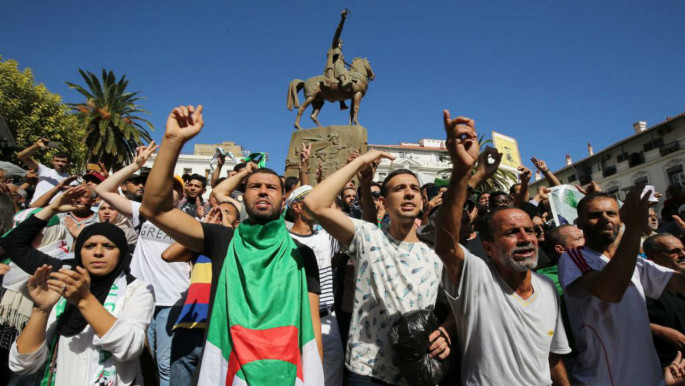Algeria announces five candidates for presidential vote as protesters reject 'unfair' elections
Algerian authorities have repeatedly said that the elections on 12 Dec are the only way to resolve the crisis faced by the north African state following the resignation of longtime leader Abdelaziz Bouteflika.
The candidates for the upcoming polls include former prime ministers Abdelmadjid Tebboune and Ali Benflis, former culture minister Azzedddine Mihoubi, former tourism minister Abdelkader Bengrine, and Abdelaziz Belaid, head of the El Mostakbal Movement party.
 |
|
| [Also read: Algerians will keep rejecting elections until they are fair and free] |
Mohamed Chorfi, the head of the election authority, announced the final list. Twenty three candidates had applied to the election authority, but most failed to meet the requirements they needed to run.
“There will be full transparency in the handling of the presidential election,” Chorfi said.
Algeria has been gripped by protesters who have been staging demonstrations every week against the upcoming elections, saying they would be unfair as some of former President Bouteflika’s allies are still in power.
Bouteflika ended his 20-year-rule of the country in April after mass protests engulfed the nation on 22 Feb 2019 demanding the removal of the ruling elite and the prosecution of those involved in corruption.
The army has become involved, like in several other neighbouring states, but the chief of staff Lieutenant General Ahmed Gaed Salah has vowed transparency and fairness for the Dec. 12 vote.
The authorities also met some of the demands by detaining several officials and prominent businessmen on charges of corruption, including two ex-prime ministers.
The activists however still demand the removal of the remaining symbols of the oldguard, including interim president Abdelkader Bensalah and Prime Minister Noureddine Bedoui.
A vote scheduled for 4 July this year was cancelled citing a lack of candidates.
Demonstrations in Algeria mirror those in Lebanon and Sudan, and are being called the second wave of the Arab Spring. Public anger against the ruling establishment has spilled into the streets, asking for good governance, better economic prospects, and no corruption.
Follow us on Twitter and Instagram to stay connected





 Follow the Middle East's top stories in English at The New Arab on Google News
Follow the Middle East's top stories in English at The New Arab on Google News
![The UAE is widely suspected of arming the RSF militia [Getty]](/sites/default/files/styles/image_330x185/public/2024-11/GettyImages-472529908.jpg?h=69f2b9d0&itok=Yauw3YTG)
![Netanyahu furiously denounced the ICC [Getty]](/sites/default/files/styles/image_330x185/public/2024-11/GettyImages-2169352575.jpg?h=199d8c1f&itok=-vRiruf5)
![Both Hamas and the Palestinian Authority welcomed the ICC arrest warrants [Getty]](/sites/default/files/styles/image_330x185/public/2024-11/GettyImages-2178351173.jpg?h=199d8c1f&itok=TV858iVg)